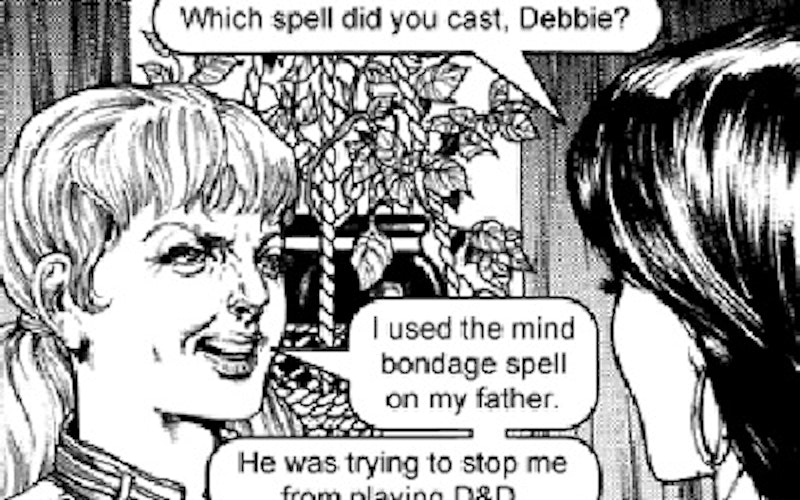
Culture At Large
New life for Dark Dungeons
Andy Rau •
Remember when the greatest threat to Christianity was a weird game that let nerds pretend to be elves and wizards in their parents' basements?
The year was 1984, the "Satanic panic" was in full swing and nothing exemplified evangelical Christianity's bizarre relationship to popular culture better than Jack Chick's infamous Dark Dungeons tract, which targeted the role-playing game Dungeons & Dragons. Now, that evangelistic tract is finally getting the cinematic treatment it deserves:
The Dark Dungeons tract, which portrayed Dungeons & Dragons as an insidious, occult indoctrination tool, has been the butt of slightly bitter gamer humor for decades. (For my money, the best response is the Dead Alewives' exposé of an "actual gaming session.") But this new film adaptation promises to play it straight. It's being produced with Jack Chick's permission and sticks close to the "plot" of the tract. Of course, presenting such an over-the-top story with a straight face is its own form of mockery, as the movie's intended audience well understands. Dark Dungeons premieres at the massive Gen Con gaming convention this summer, where a new edition of Dungeons & Dragons will also be released.
In retrospect, the anti-D&D furor that produced (and which was then amplified by) Dark Dungeons looks like the nadir of Christian engagement of popular culture. It was based on a panicky, paranoid fear of spiritual evil that was unbefitting of people who believed that Christ had already "overcome the world." It was marked by ignorance about the object of criticism. It exposed a lack of discernment, as Christians bought into and spread unfounded rumors of D&D-caused murders and suicides. And its lack of any nuance (if D&D wasn't a healthy family pastime, then it was a Satanic plot to brainwash your children) made it impossible to have actual worthwhile discussions about this strange new fad - discussions about simulated violence and fictionalized magic or about what it might mean to honor God with our imaginations. It’s also worth noting that while the D&D freakout seems relatively harmless, the broader "Satanic panic" of which it was a part did real harm to people. Altogether, the era offered a checklist of things not to do when confronted by a piece of art or entertainment that you don't understand.
Just a few decades ago, this might have seemed terribly serious.
Are things different now? Are Christians more genuinely discerning when it comes to pop culture? I think so. The Harry Potter phenomenon, which could easily have sparked a reactionary panic, instead saw a wide diversity of opinion expressed within Christian circles. Certainly a loud strain of criticism did invoke wild, Jack Chick-style theories, but that wasn't the only or most influential voice. What’s more, I've lost count of the number of essays I've read parsing popular books, television shows and films for the fingerprints of grace. Over the last two decades, a culture of Christian film and art criticism has emerged online that is helping us not to simply ask, "Is this good or evil?" but rather "What about this is noble, and what is not?"
So I look forward to laughing at the strange cultural artifact that is Dark Dungeons in its new medium. But it's worth remembering that just a few decades ago, this might have seemed terribly serious. And it's worth asking: what combination of personal, cultural and theological trends might cause me to jettison common sense when confronted by an unfamiliar piece of pop culture?
Topics: Culture At Large, Arts & Leisure, Entertainment, Theology & The Church, Evangelism